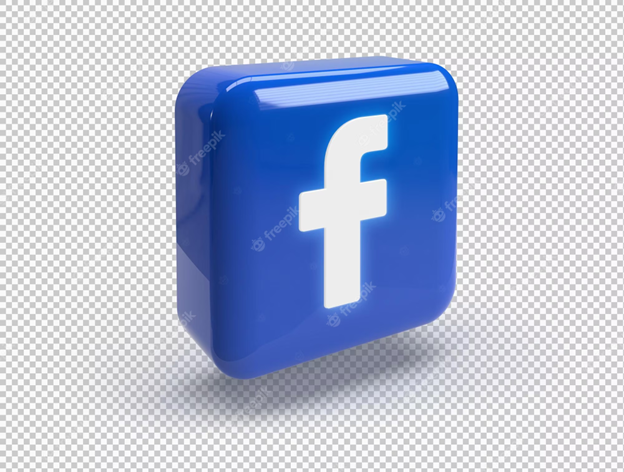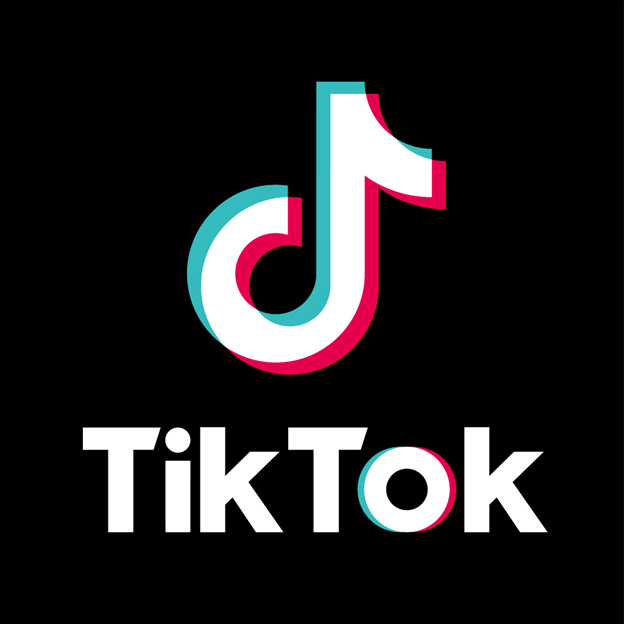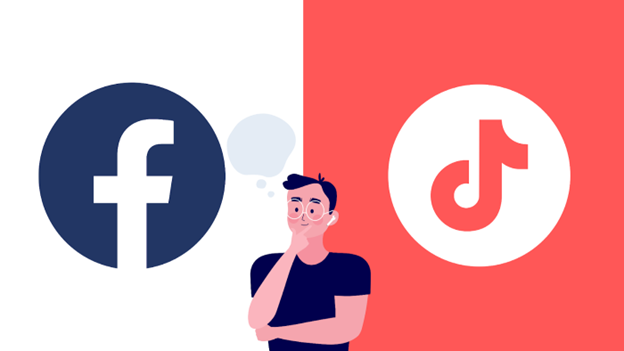Facebook and TikTok are two social media platforms that are now essential to our daily lives in the modern digital world. One of the most well-liked social media networks among users of all ages is Facebook, and another is TikTok. Both platforms allow users to share content, engage with a larger community, and connect with friends and family. Still, they are very different regarding features, target markets, and user experiences. This article compares and contrasts Facebook and TikTok to help you choose the most appropriate platform.
Differences Between TikTok and Facebook
There are several significant differences between Facebook and TikTok, including:
Features |
|
TikTok |
|
|
|
User Base | Over 2.8 billion monthly active users worldwide | Over 1.1 billion monthly active users worldwide |
|
|
Demographics | Skews towards older users (25-34 and 35-54 age groups) | Skews toward younger users (41% are aged between 16-24) |
|
|
Content-Type | Emphasis on sharing personal updates, news, and media | Emphasis on short-form, creative videos |
|
|
Algorithm | Prioritizes content from friends and family | Prioritizes content based on user behavior and engagement |
|
|
Revenue | Generates revenue primarily through advertising but also through e-commerce and gaming. | Revenue is mainly generated through advertising, but TikTok has also started experimenting with e-commerce and in-app purchases. |
|
|
Advertisements | Provides a range of business advertising options | Advertising is mostly limited to short video ads |
|
|
Privacy and Security | Gotten flack for privacy and data protection | Has come under fire for censorship and data gathering |
|
|
Market Capitalization | Over USD 1 trillion | Over USD 400 billion |
|
|
Other Platforms | Holds a stake in Instagram, WhatsApp, and Oculus VR | Parent company ByteDance also owns Douyin, a Chinese version of TikTok, and Toutiao. |
|
|
Monetization | Enables publishers and creators to earn money | Provides options for monetization for creators via the Creator Fund |
|
|
Social Impact | This platform has received negative feedback for its contribution to spreading false information, creating divisions in political discussions, and allowing harmful content to be shared. | Has faced criticism over data privacy, content moderation, and concerns around its Chinese ownership. |
|
|
Features | Offers a variety of features such as Groups, Pages, Events, Messenger, and Live Streaming. | Features include video editing tools, filters, effects, soundtracks, and challenges and duets that allow users to collaborate and interact with each other. |
|
|
History | A social networking site for college students was established in 2004. expanded to a worldwide audience and buying additional social media sites. | Initially released in China as a lip-syncing app in 2016, it went global after merging with Musical.ly. |
|
|
User Engagement | Users frequently interact with various content types, including news, photos, and videos, for longer periods on the platform. | Shorter sessions are more common, with users concentrating on watching and making short-form videos. |
Facebook: What is it?

Mark Zuckerberg founded the social media website Facebook in 2004. Initially intended to connect Harvard students, it quickly became well-liked and spread to other universities before becoming available to the general public. Facebook dominates the social media market with an impressive 2.7 billion monthly active users globally.
Features of Facebook
Facebook provides many tools to communicate with loved ones effectively, share important information, and explore various interest groups. Facebook offers several useful features, such as:
-
News Feed:
Facebook’s main feature, the News Feed, allows users to see updates from their friends and the pages they follow.
-
Profile:
Users can share their latest updates, photos, and videos on their page or profile with friends and followers.
-
Groups:
Users can connect with people who have similar interests or pastimes through Facebook Groups, which are online communities. Users can post and share content with other participants in groups they can join or create.
-
Marketplace:
Facebook Marketplace is a marketplace where people in local communities can buy and sell goods and services. The platform allows users to browse or search for items, contact sellers, and conduct transactions without intermediaries.
-
Events:
Users can create and RSVP to events on Facebook Events, even virtual ones. Users can send invitations to friends, share event information, and get alerts about impending events.
-
Messenger:
Users of the messaging service Facebook Messenger can connect with their loved ones. Video calls, voice calls, and group chats are features available in Messenger.
-
Pages:
Facebook Pages are used by companies, organizations, and public figures to connect with their followers and share updates. Pages can have features like reviews and messaging and branding elements like logos, cover photos, and other branding elements.
-
Fundraising:
Facebook Fundraising allows users to create fundraising campaigns for non-profit organizations or personal causes. Users can set a fundraising target, publicize their campaign to friends and family, and monitor their progress.
Benefits of Facebook:
Facebook has several advantages, such as:
-
Community:
Users can connect with others and feel a sense of belonging on Facebook by joining groups and pages with similar interests.
-
Promotion:
Businesses can advertise their goods and services to a large audience on Facebook.
-
Communication:
Facebook users can communicate via comments, video calls, and Messenger.
-
Informational Materials:
Facebook can be a helpful source of news and information because many journalists and news organizations use it to share their content. Users can follow their preferred sources for recent events and news updates.
-
Networking:
By enabling users to connect with coworkers, subject matter experts, and potential employers, Facebook can be a potent networking tool for business people. Users can also join organizations and communities for professionals to exchange resources and information.
-
Maintaining Contact:
Facebook enables users to keep in touch with their loved ones who may be far away or whom they don’t see frequently. Users can receive updates from others and share updates, photos, and videos with their network.
-
Marketing and Advertising:
Facebook can be a useful platform for businesses to use in their advertising and marketing campaigns to reach their target audience. Businesses can use Facebook to reach potential customers and expand their customer base with specific targeting options and the ability to track results.
Drawbacks of Facebook:
Facebook has several advantages, but it also has some drawbacks, such as:
-
Privacy Issues:
Facebook has come under fire for how it handles user data and privacy issues. Users might not be aware of the extent to which their information is being gathered, shared, and used, and they might not have any control over it.
-
Addiction and Time-Wasting:
Users can become dependent on Facebook and spend hours scrolling through and interacting with content. Time and productivity losses and detrimental effects on mental health and well-being may result.
-
Misinformation Propagation:
Facebook’s involvement in disseminating false information and fake news has drawn criticism. False information or propaganda may be presented to users, harming society and democracy.
-
Cyberbullying and Harassment:
Cyberbullying and harassment are issues that Facebook users may face from others who use the platform. Especially for young people, this may hurt their mental health and well-being.
Facebook Login Instructions
The steps to sign into Facebook are as follows:
- Start your computer or mobile device’s web browser.
- Go to www.facebook.com to access the Facebook website.
- Put your email or phone number in the “Email or Phone” field on the Facebook home page.
- Next, fill out the “Password” field with your password.
- Select “Login” from the menu.
- You will be taken to your Facebook news feed if you have entered the proper login information. You can reset the password by clicking the “Forgot Password” link if you’ve lost it. To safeguard your privacy and personal information, log out of your account after using a shared device.
Facebook Usage Guidelines
Facebook is easy to use and intuitive. Users can open a free account, profile and interact with friends and family. Users who want to make the most of Facebook can:
- Join pages and groups that are relevant to your interests.
- Like, comment, and share content to show your engagement with it.
- To get in touch with loved ones, use Messenger.
- Produce and distribute content that appeals to their audience.
TikTok: What is it?

The Chinese business ByteDance introduced TikTok as a social media platform in 2016. The platform was rebranded as TikTok for the international market after being known as Douyin in China. TikTok has more than 1.5 billion monthly active users and has become very popular among younger audiences.
Features of TikTok
TikTok provides a unique user experience when compared to other social media platforms. TikTok’s main characteristics include:
-
Short-form videos:
TikTok users have the option to make short-form videos up to 60 seconds long, with an emphasis on originality and entertainment.
-
Hashtag Challenges:
TikTok is well-known for its hashtag challenges, where users produce and share content based on a predetermined theme or challenge. These contests, which are frequently started by brands or influencers, have the potential to go viral as users from all over the world start producing and sharing their content.
-
Filters and Effects:
On TikTok, users can access various filters and effects to enhance their videos. Examples of these include text overlays, face filters, and AR effects.
-
Music Library:
Users of TikTok can use a sizable collection of authorized music in their videos. Users can browse by genre or mood and search for specific songs.
-
Feature Duet and React:
Users can work together to create content on TikTok using the duet and react features. Users can make a split-screen video with another user’s video using the duet feature and record their reaction to another user’s video using the react feature.
-
Live streaming
TikTok users can live stream their content, allowing them to interact in real-time with their audience. Additionally, live streaming can be used for interactive events like performances and Q&A sessions.
-
Monetization:
TikTok recently provided creators with monetization options, enabling them to profit from their content through in-app purchases and brand partnerships.
Benefits of TikTok
TikTok provides several advantages, such as:

-
Engagement:
Users of TikTok can like, comment, and share content with their followers to increase engagement.
-
Viral potential:
TikTok users can easily build a sizable following through their content, giving the app a high potential for virality.
-
Imaginative Outlet:
TikTok gives users a platform to express themselves creatively through brief video content. Users can experiment with various video editing methods to produce original content. This creative freedom has also made TikTok a popular platform for UGC creators, who produce authentic, user-led content for brands, communities, and audiences without the need for highly polished or traditional advertising formats.
-
Entertainment:
The variety of content accessible for viewing and interaction on TikTok may provide users entertainment. Users can find content that suits their interests, from comedy skits to dance videos.
-
Education:
TikTok users share information on various topics, including science, history, cooking, and art, making it a platform for education and learning. This might be a helpful resource for users who want to broaden their knowledge or develop new skills.
-
Community Development
TikTok has the potential to serve as a platform for building community because users can connect and establish support networks based on their shared experiences and interests.
Drawbacks of TikTok:
Although TikTok has many benefits, there are some drawbacks as well, including:
-
Cyberbullying:
TikTok can be used as a venue for harassment and cyberbullying, just like any other social media platform. Users’ general and mental health may be harmed if they encounter unfavorable remarks or messages from others.
-
Addiction and Time Wastage:
TikTok users may spend hours scrolling through content and interacting with other users, which can be addictive. This could result in time and productivity loss and detrimental effects on mental health and well-being.
-
Privacy Concerns:
TikTok’s handling of user data and privacy concerns has been criticized, particularly in light of its connections with the Chinese government. Users might not be aware of how much their information is gathered, shared, and used, and they might not have any control over it.
-
Inappropriate Content
TikTok has been fired for hosting objectionable or pornographic content, especially on its For You page algorithm. Users may be exposed to content that isn’t appropriate for their interests or demographic, which could be detrimental to both their mental and physical health.
TikTok Login Instructions
The steps to log into TikTok are as follows:
- Go to the TikTok app on your smartphone and launch it.
- Access your account by tapping the “Me” icon in the below-right corner of the screen. If you haven’t created an account yet, follow the instructions by clicking “Sign Up.”
- On the “Me” page, click the “LogIn” button next to your username.
- To access your TikTok account, you must provide your phone number or email address.
- Enter your password and select “Login.” Upon successful verification, you will be directed to your profile.
- Reset your password by selecting “Forgot Password.” Always log out of your account on shared devices for privacy and security.
Tips For Using TikTok
It’s simple and easy to use TikTok. Users can create a profile, register for a free account, and start creating and sharing content. TikTok users can maximize their experience by:
- Investigate the “For You” page to learn about fresh information and trends.
- Like, comment, and share content to show your engagement with it.
- Utilizing the built-in editing tools, users can create and share original content.
- Create duets and reactions in cooperation with other users.
Similarities Between Facebook and TikTok:
Facebook and TikTok have some similarities despite their differences, such as:
-
Use of social networking
The ability to connect with people and share content is provided by both platforms, which are social networking websites.
-
Algorithms:
Both platforms use algorithms to encourage user interaction and suggest content to them.
-
Advertising:
Both platforms provide businesses with advertising options to market their goods and services.
Frequently asked questions about Facebook vs. TikTok:
Q. How safe is it to use TikTok?
Although TikTok has come under fire for its safety policies, the platform has taken steps to ease these worries and offer users a secure environment.
Q. Which platform—Facebook or TikTok—is better for businesses to advertise on?
The target market and advertising objectives will determine this. Facebook is a powerful platform for companies of all sizes because it provides a wide range of advertising options, targeting tools, and an established advertising ecosystem. Contrarily, TikTok is more geared toward short-form videos and creative content, making it a better choice for companies that want to present their goods or services in an eye-catching and captivating manner. However, compared to Facebook, TikTok’s advertising options are more constrained.
Q. Which social media site is more effective for connecting with friends and family?
Facebook offers a wider variety of communication options, such as Messenger and video calls, making it better suited for connecting with friends and family.
Q. Facebook or TikTok: which one is more secure and safe?
Both platforms have received criticism for their security and privacy policies. Facebook has previously dealt with several privacy scandals and data breaches, whereas TikTok has been accused of gathering user data and censoring content. Protecting data and being aware of social media risks are crucial.
Q. Can you use TikTok and Facebook simultaneously?
Yes, you can simultaneously use both platforms. TikTok users frequently share their original content on Facebook and other social media sites. In actuality, Instagram, a well-liked platform for sharing brief videos akin to TikTok, is owned by Facebook.
The Final Words
The decision between Facebook and TikTok ultimately comes down to the user’s needs and preferences because each platform has particular advantages and disadvantages. TikTok offers a distinctive user experience with its focus on creativity and entertainment, unlike Facebook. This more conventional social media platform enables users to connect with friends and family and promote businesses. Users can select the platform most suitable for their needs by understanding their similarities and differences.
